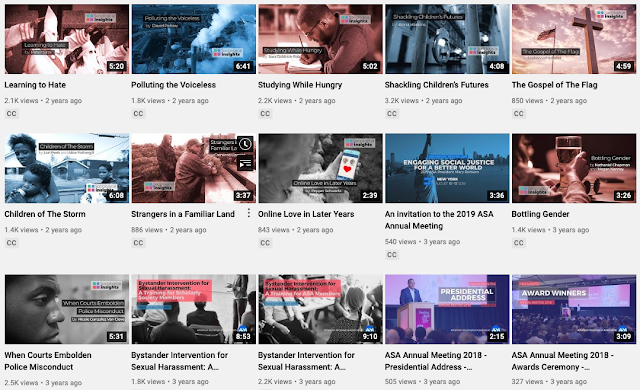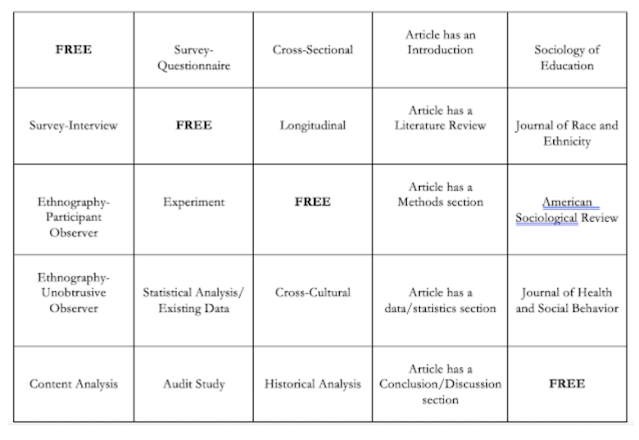As we wait for class to start, be sure you have an original research article ready to dissect. If you are not sure of your article, feel free to call me over to look at it. Try to label the different sections of your article:
Abstract
Introduction
Literature Review
Methods
Data/Stats
Conclusion
Discussion/moving forward
Also - please look over the reading, Gang Leader for a Day Introduction and be ready to discuss it.
HW: Read Joel Charon's Should We Generalize?
Today's lesson focus:
What are the different types of sociological research?
How do sociologists do research?
Venkatesh's Gang Leader for a Day
Thoughts on the reading?
Questions?
 |
| Here is a view of the complex of Robert Taylor Homes, a CHA project that used to be near U of Chicago. It was 28 buildings along a two-mile stretch designed for 11,000 people but peaked at 27,000 residents, of which 95% were unemployed and 96% were black. |
1. What are the two broad ways sociologists gather data? (Venkatesh mentions these).
2. Brainstorm:
What are the advantages and disadvantages of these 2 broad ways of researching?
Today's lesson will focus on how sociologists actually do the work that they publish about. Venkatesh highlights a number of different ways that sociologists examine society. We will use his introduction to dive into how sociologists do research.
Quantitative Qualitative
statistical analysis comparable descriptive analysis
value free values are present and explicit
less context contextual/nuanced
statistical analysis comparable descriptive analysis
value free values are present and explicit
less context contextual/nuanced
many cases/subjects fewer cases/subjects
researcher is detached researcher is involved
research is pointed research is open-ended
researcher is detached researcher is involved
research is pointed research is open-ended
Now, let's add other types of general research.
General Types of Sociological Research
- Longitudinal - a study that examines subjects over an extended period time. For example, a researcher might interview kids at age 5, then at age 15 and then again at 25. Some research is conducted over the course of decades by different researchers.
- Cross-sectional - a study that examines a group of people at a single point in time. For example, like taking a section of cake that has different layers, a researcher might take a sample of people from a group like SHS. The research might examine 10 students from each grade to get an understanding of the school as a whole. The key here is that the researcher studies a bunch of people from the same group/society.
- Cross-cultural - a study that compares subjects from two or more cultures. The key here is that a cross-cultural study examines people that are part of different groups/societies and compares them.
- Qualitative or Quantitative - qualitative is subjective and descriptive; it examines the qualities about a subject. Quantitative is objective and involves examining numbers or statistics.
3. Is Venkatesh's research better considered longitudinal or cross-sectional?
4. Any questions about the general types of research?
What general types of research is the article that you found?
Now let's examine the specific ways that sociologists gather their research.
Methods of sociological research
These are some of the more common methods of research that you will come across in sociology:
Qualitative:
Interviews - questions that are open-ended.
Field work/ethnography - observing subjects by living with them, watching them and taking notes, such as Nicole Gonzalez Van Cleve's research about the Cook County Courthouse System.
Historical analysis - examing changes over time in comparison to present day.
Content Analysis - examining the content of media or other cultural productions
Here is an example of content analysis about climate change.
Quantitative:
Survey - questionnaires that are close-ended such as multiple choice or likert scale.
Experiment/Audit study - comparing the responses of two or more different reactions.
Statistical analysis - existing sources (data sets, such as GSS or Census data)
Jacob Farber from NYU explains his research based on existing data here in his study titled "Complaining while Black"
There are many data sets available to sociologists and other researchers. This type of research involves examining the data in new ways. Here is a list of data sets that are often used by sociologists:
For more detail about the research methods in sociology, Open Stax sociology textbook explains the methods in this chapter.
The ASA has many more brief explanations of sociological research on their Youtube channel here (see below). watch one and try to figure our what type of research the author used.
Which of the methods above does Venkatesh use in the excerpt from Gang Leader? Explain when/how. (Arguably he does 5 of them!)
What research method(s) does the researcher use in the article that you found?
Important considerations in research; The importance of both ethics and peer-review in research:
Read this critique of Venkatesh's work and answer the question below.
What are the criticisms of Venkatesh's Gang Leader research?
For more info on Venkatesh's work:
- Gang Leader for a Day on Amazon.
- Read an excerpt from the book and download Venkatesh reading and talking about his book from NPR.
- Venkatesh speaking on the Colbert Report and he explains that there are important ways of doing research correctly.
- Venkatesh speaking about his book and the research he did.
- An interview at slate.com between Venkatesh and Alex Kotlowitz (There Are No Children Here).
Analyze the article that you found and determine the research method(s) that the author(s) use.
Research Bingo
Find someone who has one of the following. You can only use each person once. Have that person sign the square. When you have five in a row, shout bingo!
You can download this Bingo card by clicking here.
HW: Read Joel Charon's Should We Generalize?




No comments:
Post a Comment